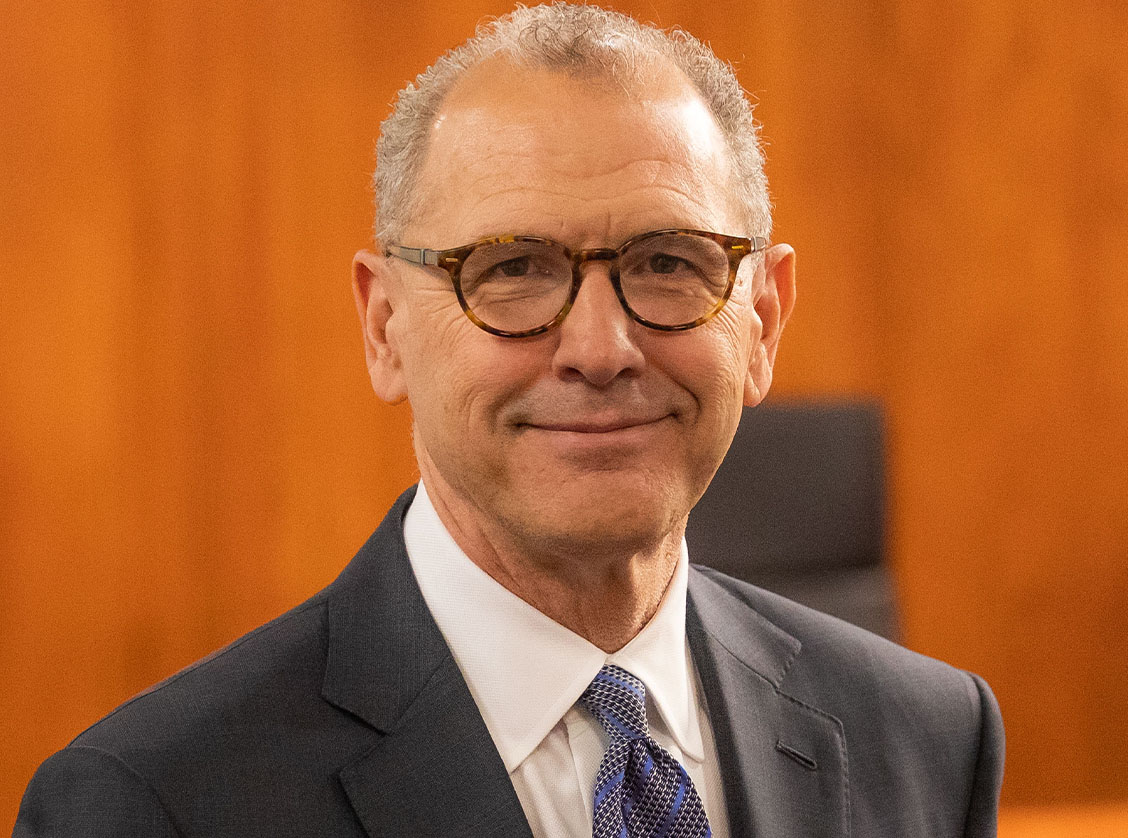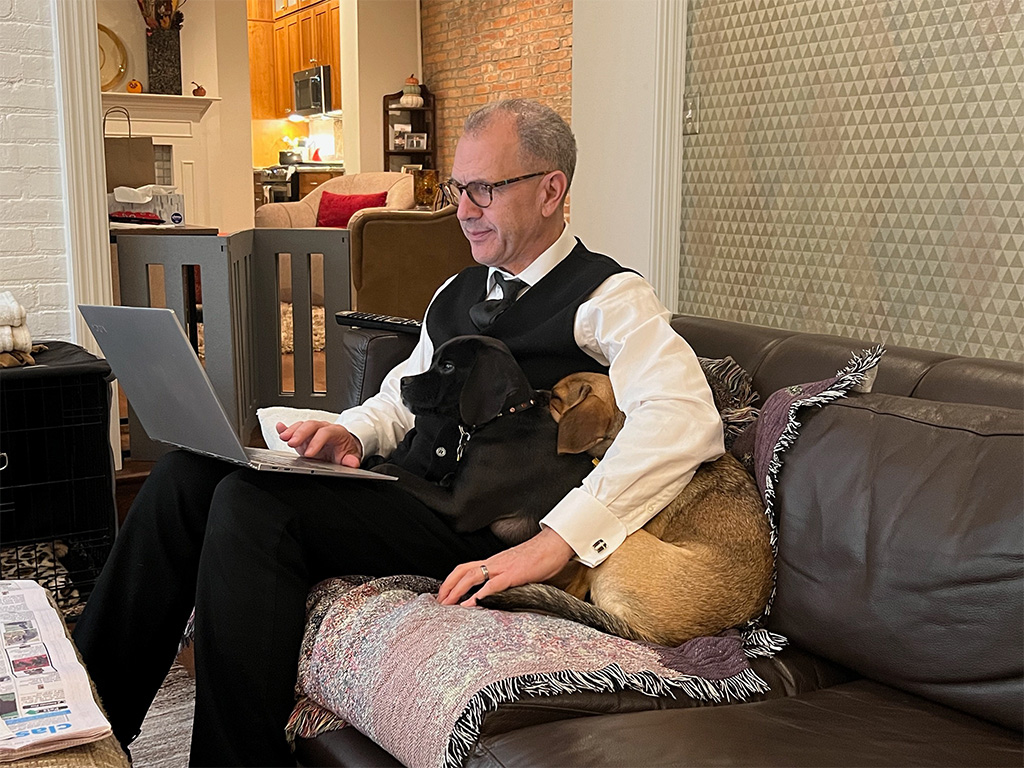James (Jim) Thomas '87
Empowering Others to succeed
May 1, 2023

James (Jim) D. Thomas ‘87 is the Founder and President of James D. Thomas Consulting Co. and James D. Thomas Law Co. He has over thirty years of experience as a leader and mentor. He regularly speaks, consults, and coaches other professionals within and outside of the legal field.
Jim also maintains a limited legal practice with an emphasis on special appointments, arbitration matters, mediation, and private judging engagements. He also serves as an adjunct professor at the Michael E. Moritz College of Law at The Ohio State University. Previously, he also taught as an adjunct professor at Toledo Law. Jim has spent most of his career focusing on large-scale litigation commercial cases, including restructuring matters, contract claims, and matters alleging fraudulent activity.
When Jim began his legal career, he clerked for the Honorable David D. Dowd, Jr. “He was the single biggest influence in my legal career,” says Jim, “and next to my parents, a personal mentor that taught me many life lessons that I still draw upon each day.” Following his clerkship, he gained experience in the courtroom as a litigation associate with Squire, Sanders, & Dempsey.
Enjoying spending time in the courtroom, Jim was inspired to apply to be a United States Magistrate Judge in the Northern District of Ohio. His mentor, Judge Dowd, said there wasn’t a chance of him getting it, due to his young age and not being from the Youngstown, Ohio area. Despite this, Jim was still motivated to apply and was appointed, at the age of 33, to serve as Magistrate Judge with his chambers in Youngstown. He also “rode circuit,” conducting hearings in the Akron and Cleveland federal courthouses.
Jim returned to Squire Sanders in 2001 after his service as Magistrate Judge. During his time at Squire Sanders, Jim quickly became a partner and served as the Practice Group Leader for the Cleveland litigation group, maintaining an active trial docket with a national scope. In 2008, Jim became the Practice Group Leader for the Global Litigation Group, where he was charged with the leadership, management, and overall profitability for one of the firm’s two largest practice groups with over 250 legal professionals worldwide. Prior to setting out on his own, Jim also spent about three and a half years as a partner at Vorys, Sater, Seymour and Pease LLP, where he focused on complex civil litigation and served as counsel and advisor to senior level leaders in law, business, and government.
“Service as a United States Magistrate Judge at the early age of 33 clearly stands out,” says Jim when asked about his career highlights. “That said, the other opportunities I had with Squire Sanders as the head of the Global Litigation group was a real lesson in leadership, especially my work in the United Kingdom in integrating a UK litigation group with a US litigation group.”
When asked what he has found most satisfying about his career thus far, Jim says simply: “The ability and opportunity to have a positive influence on someone else’s development. In the various leadership and mentor roles I have had, I take great satisfaction from being able to help in some way to advance others in their own career.”
Jim earned his B.A. in Political Science from Adrian College in 1984 and his J.D. from Toledo Law in 1987, where he served as Editor-in-Chief of the University of Toledo Law Review.
Q&A with Jim Thomas
What was the reason you pursued law school?
I took a political science course entitled “Recent Supreme Court Decisions,” and the
case law analysis and reasoning piqued my interest in the law.
How did you decide on Toledo Law for your legal education?
Toledo Law was one of the few schools that accepted me for admittance. My first two
years of undergraduate studies did not go well, and I spent the following two years
rebuilding my grade point average. As a result, I did not have a lot of options in
pursuing law school admission. Toledo Law was the strongest of the law schools that
accepted me and was within driving distance of Taylor, Michigan, where my wife worked
full time to support us during law school. She drove an hour each way all three years.
Do you have a favorite memory from attending Toledo Law?
I would not say that I have a specific favorite memory but rather, and as I often
say publicly, the overall experience at Toledo Law was extremely positive. I enjoyed
the professors, save for one, and we met some of our best friends to this day. Most
importantly, I believe that I received an excellent education that allowed me to compete
in the legal marketplace after graduation. We also enjoyed the city of Toledo, which
at the time was just opening or had just opened the downtown waterfront Portside area,
and there was a lot of energy downtown during that time frame.
What was most helpful to you during your time at Toledo Law?
Overall, my wife, Michelle. Also, the overall friendliness of those teaching at Toledo
Law and my classmates.
How did you obtain your first position?
We sent out a ton of applications, which was the norm for the day if you wanted federal
clerkship. I knew I wanted to do a federal clerkship because I was interested in trial
work, and I thought that clerking with a trial judge would either confirm that or
send me on a different path.
What are some of the struggles you have encountered and how did you navigate?
As with most lawyers, there is always the challenge of balancing the time commitment
and the stress of legal work. For the most part, I think I have done that well. Sometimes,
not so well.
What were some career pivot-points/decisions that led you to where you are now?
Probably the most significant pivot was when I applied to be a United States Magistrate
Judge. My mentor, Judge Dowd, said that I did not have a chance in hell – his reasoning
was that I was so young and not from the Youngstown, Ohio area, where I would be sitting.
He was being practical, but that motivated me even more. The second most significant pivot was probably my decision to leave Squire Sanders
in 2014. I had hit a leadership ceiling and knew that I was ready for change. It was
difficult to leave, because I had invested a lot in the firm and many of the lawyers
at the firm. It was a tough decision but one that I do not regret. The firm was very
helpful to me in the transition, and I still have many friends there.
What has been the most challenging aspect of your current (or a recent) position?
In my current role, it is just me and a long-time colleague of mine, Christopher Shea,
whom I met at Squire Sanders early in my career. We have worked on and off together
ever since, starting with his service as my first law clerk when I became a Magistrate
Judge. Working in a small office can be a juggling act at times, and I do miss the
support that comes along with working in a large firm or organization.
What have you found most satisfying about your career thus far?
The ability to have a positive influence on someone else’s development. In the various
leadership and mentor roles that I have had, I have taken great satisfaction from
being able to help in some way to advance someone else’s career.
Where do you see areas for growth on the part of the legal profession?
As with other industries and professions, and I am not sure it is a growth area, but
it is concept that the profession is going to continue to adjust to the new work environment
post-pandemic. From the law side, while virtual tools are essential and are here to
stay, I am a firm believer in in-person work environments especially in the legal
field. In my view, those that manage that balance between flexibility and in person
will do best.
Do you have any suggestions for law students/new lawyers interested in a similar path?
What should new attorneys keep in mind and be thinking about?
It is straightforward. Get the best possible grades that you can, and that opens a
lot of doors for you to choose what you want to do. Specifically for Toledo Law students, and I have given this advice in live programs, is going forward from Toledo Law,
never apologize for where you went to law school or where you are from. Toledo Law
students will run into lawyers that may have attended more “elite” schools, but the
education a Toledo Law student will receive will allow the Toledo grad to compete
with anyone. In short, do not be intimidated by someone’s law school resume line.
How has your family supported you in your legal career?
As noted above, my wife and I were married a few weeks before the start of law school.
Fortunately, we are still married, and without a doubt, my success and achievements
as a lawyer are attributable to her support.
What was the best advice you ever received?
From my father, once you give your word to do something, you better follow through
on it. I am not always successful on that front, but that is a guiding principle that
I strive to live up to.
What do you enjoy doing outside of work?
Reading and spending time with my wife and our puggles, Luci and Bo.




